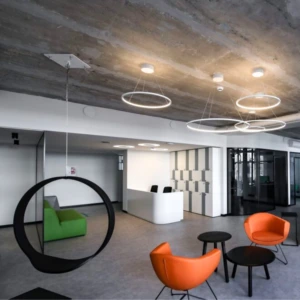The programme is only conducted in Lithuanian language. Entry requirements for this particular programme can be found in the programme description provided in Lithuanian language.
in Lithuanian
As information flows increase and business processes become more complex, systems architects bring order to this digital chaos. This study programme provides the skills to design and manage advanced information systems, from performance analysis to artificial intelligence solutions. Digital Transformation and Systems Architectures graduates become experts in designing digital solutions and transforming the way organisations work, while the choice of specialisation (from data security to leadership) allows them to develop a unique professional profile.

The curriculum is partly designed and taught by practitioner lecturers, there are guest lectures by business representatives. The demand for digitisation specialists in the job market consistently exceeds the supply.

You will learn how to use specialised tools such as Magic System of Systems Architect, IBM Rational DOORS Next, SQL Server Business Intelligence Edition, Pegasystems PEGA and MS Project, which are used at different stages of the development of a solution for digitalisation of operations.

All modules of the programme involve complex practical tasks, simulating real-life situations and problems. Throughout the study process, the programme’s lecturers provide individual attention and guidance to help you achieve the best results.

You can choose to study as a field expert or take a related qualification in another field of study. The topic of the master’s thesis can be adapted to a task or problem of interest to the student.
You will gain the knowledge and skills needed to drive the digital transformation of businesses and society. This programme will equip you to develop and manage a wide range of information systems, with a focus on requirements, business analysis, system design, organisational architecture, and project management. You will also learn how to analyse data and have the opportunity to explore areas such as system security, artificial intelligence, and other topics relevant to your interests.
The Digital Transformation and System Architectures programme will allow you to apply these skills in your chosen career path:
Responsible for the vision and alignment of the information system/product with the organisation’s objectives, defining requirements, formulating tasks for the development team and ensuring successful product development.
Defines the methodology and plans, coordinates, and oversees the analysis, design, implementation, deployment, and other key processes involved in systems development, expansion, or integration projects.
Manages AI-enhanced operational computing solutions, and data analysis agents, ensuring the smooth and efficient functioning of the organisation.
| Module name | Credits | Method of organisation |
|---|
| Enterprise Architecture Modelling | 6 | Blended learning |
| Information Systems Project Management Technologies | 6 | Blended learning |
| Information Systems Requirements Analysis and Specification | 6 | Blended learning |
| Research Project 1 | 6 | Blended learning |
| Courses of Study Field (Competence of Expert) | 6 |
| Computational Intelligence and Decision Making | 6 | Blended learning |
| Business Process Management | 6 | Blended learning |
| Development of Challenge-Based Innovation | 3 | Blended learning |
| Optional Micro-modules | 3 | Distance learning |
| Multimedia Content Creation Methods | 6 | Blended learning |
| Data Mining Methods | 6 | Blended learning |
| Cryptographic Systems | 6 | Blended learning |
| Studies of Modern Languages (Level A1) | 6 | On-campus learning |
| Studies of Modern Languages (Level A2) | 6 | On-campus learning |
| Studies of Modern Languages (Level B1) | 6 | On-campus learning |
| Studies of Modern Languages (Level A1) | 6 | On-campus learning |
| Studies of Modern Languages (Level A2) | 6 | On-campus learning |
| Studies of Modern Languages (Level B1) | 6 | On-campus learning |
| Studies of Modern Languages (Level A1) | 6 | On-campus learning |
| Studies of Modern Languages (Level A2) | 6 | On-campus learning |
| Studies of Modern Languages (Level B1) | 6 | On-campus learning |
| Studies of Modern Languages (Level A1) | 6 | On-campus learning |
| Studies of Modern Languages (Level A2) | 6 | On-campus learning |
| Studies of Modern Languages (Level B1) | 6 | On-campus learning |
| Studies of Modern Languages (Level A1) | 6 | On-campus learning |
| Studies of Modern Languages (Level A2) | 6 | On-campus learning |
| Studies of Modern Languages (Level B1) | 6 | On-campus learning |
| Studies of Modern Languages (Level A1) | 6 | On-campus learning |
| Studies of Modern Languages (Level A2) | 6 | On-campus learning |
| Studies of Modern Languages (Level B1) | 6 | On-campus learning |
| Business Law | 6 | Blended learning |
| Strategic Management | 6 | On-campus learning |
| Project Planning and Organisation | 6 | Blended learning |
| Studies of Modern Languages (Level C1) | 6 | On-campus learning |
| Business Regulation | 6 | Blended learning |
| Module name | Credits | Method of organisation |
|---|
| Information Systems Software Engineering | 6 | Blended learning |
| Research Project 2 | 6 | Blended learning |
| Semantic Models of Data | 6 | Blended learning |
| Optional Subjects 2026 IF | 6 |
| Courses of Study Field (Competence of Expert) | 6 |
| Methods for Software Quality Assurance | 6 | Blended learning |
| Quality Management | 6 | Distance learning |
| Development of Challenge-Based Innovation | 6 | Distance learning |
| Principles of Image Perception | 6 | Blended learning |
| Multivariate Statistical Models | 6 | Blended learning |
| Data Security Technologies | 6 | Blended learning |
| Studies of Modern Languages (Level A2) | 6 | On-campus learning |
| Studies of Modern Languages (Level B1) | 6 | On-campus learning |
| Studies of Modern Languages (Level B2) | 6 | On-campus learning |
| Studies of Modern Languages (Level A2) | 6 | On-campus learning |
| Studies of Modern Languages (Level B1) | 6 | On-campus learning |
| Studies of Modern Languages (Level B2) | 6 | On-campus learning |
| Studies of Modern Languages (Level A2) | 6 | On-campus learning |
| Studies of Modern Languages (Level B1) | 6 | On-campus learning |
| Studies of Modern Languages (Level B2) | 6 | On-campus learning |
| Studies of Modern Languages (Level A2) | 6 | On-campus learning |
| Studies of Modern Languages (Level B1) | 6 | On-campus learning |
| Studies of Modern Languages (Level B2) | 6 | On-campus learning |
| Studies of Modern Languages (Level A2) | 6 | On-campus learning |
| Studies of Modern Languages (Level B1) | 6 | On-campus learning |
| Studies of Modern Languages (Level B2) | 6 | On-campus learning |
| Studies of Modern Languages (Level A2) | 6 | On-campus learning |
| Studies of Modern Languages (Level B1) | 6 | On-campus learning |
| Studies of Modern Languages (Level B2) | 6 | On-campus learning |
| Administrative Law | 6 | Blended learning |
| Management of Persons and their Groups | 6 | On-campus learning |
| Project Social and Economical Evaluation | 6 | Blended learning |
| Academic Writing | 6 | On-campus learning |
| Industrial economics | 6 | On-campus learning |
| Module name | Credits | Method of organisation |
|---|
| Business Process Analysis and Digitalization | 6 | Blended learning |
| Data Analytics and Visualization | 6 | Blended learning |
| Product Development Team Management and Decision Making | 6 | Blended learning |
| Research Project 3 | 6 | Blended learning |
| Courses of Study Field (Competence of Expert) | 6 |
| Information Technology Security Methods | 6 | Blended learning |
| Business Process Analytics | 6 | Blended learning |
| Optional Challenges | 6 | Distance learning |
| 3D Visualization Methods | 6 | Blended learning |
| Time Series Analysis | 6 | Blended learning |
| Blockchain Methods | 6 | On-campus learning |
| Studies of Modern Languages (Level B1) | 6 | On-campus learning |
| Studies of Modern Languages (Level B2) | 6 | On-campus learning |
| Studies of Modern Languages (Level C1) | 6 | On-campus learning |
| Studies of Modern Languages (Level B1) | 6 | On-campus learning |
| Studies of Modern Languages (Level B2) | 6 | On-campus learning |
| Studies of Modern Languages (Level C1) | 6 | On-campus learning |
| Studies of Modern Languages (Level B1) | 6 | On-campus learning |
| Studies of Modern Languages (Level B2) | 6 | On-campus learning |
| Studies of Modern Languages (Level C1) | 6 | On-campus learning |
| Studies of Modern Languages (Level B1) | 6 | On-campus learning |
| Studies of Modern Languages (Level B2) | 6 | On-campus learning |
| Studies of Modern Languages (Level C1) | 6 | On-campus learning |
| Studies of Modern Languages (Level B1) | 6 | On-campus learning |
| Studies of Modern Languages (Level B2) | 6 | On-campus learning |
| Studies of Modern Languages (Level C1) | 6 | On-campus learning |
| Studies of Modern Languages (Level B1) | 6 | On-campus learning |
| Studies of Modern Languages (Level B2) | 6 | On-campus learning |
| Studies of Modern Languages (Level C1) | 6 | On-campus learning |
| Labour Law | 6 | On-campus learning |
| Business Process Management | 6 | Blended learning |
| Financial Management Decisions | 6 | Blended learning |
| Marketing Management | 6 | Blended learning |
| Negotiation and Conflict Management | 6 | Blended learning |
| Project Planning and Organisation | 6 | Blended learning |
| Psychology of Leadership and Management | 6 | Blended learning |
| Project Quality and Risk Management | 6 | On-campus learning |
| Public Speaking | 6 | On-campus learning |
| Economical Valuation of Innovations | 6 | Blended learning |
| Module name | Credits | Method of organisation |
|---|
| Master’s Degree Final Project | 30 | Blended learning |
The programme is only conducted in Lithuanian language. Entry requirements for this particular programme can be found in the programme description provided in Lithuanian language.
in Lithuanian
This study programme helps you to deepen your knowledge of IT and understand how digitisation works. In lectures, we put technology into practice and analyse systems. What I liked most is that theory is always linked to practice. The analysis of real IT projects, discussions with the lecturers and various assignments give you an insight into how things work in the real world, not just in theory.

During my Master’s studies, I expanded my expertise in systems architecture design, analytical methods, and project management. Studying Digital Transformation and System Architectures best suited my professional needs and interests. After graduating, my career changed from a junior systems analyst to a project manager. The knowledge I gained during my studies has definitely contributed to this career path.

Masters studies are an opportunity to deepen your knowledge, find solutions, experiment and understand how to justify your opinions. These are important qualities that are expected at work, especially when a professional wants to move up the career ladder. KTU graduates stand out not only in the Lithuanian context but also abroad, as they are trained to be excellent product managers and analysts.
Students enrolling on this programme must be fluent in Lithuanian as all teaching, coursework and assessment is conducted in this language.
No, a bachelor’s degree in the computing sciences subject group is not required. A bachelor’s degree in any discipline is sufficient, but if it is not related to engineering, technology, mathematics or the physical sciences, one of the following two conditions must be met: at least 30 credits in informatics, informatics engineering or mathematics, or at least one year of significant work experience in a field related to the study programme.
The Digital Transformation and System Architectures programme is worth choosing because it develops analysis, modelling and decision-making skills that are beyond the reach of even the most sophisticated modern artificial intelligence models. In addition, the study process emphasises practical knowledge and skills: all study modules include individual or team projects and the programme has practitioner lecturers. Despite its depth, the programme has been successful with students from a wide range of undergraduate backgrounds.

Talk to us, study with us:
K. Donelaičio St. 73, LT-44249 Kaunas
phone +370 679 44 555
email studijos@ktu.lt
Faculty of Informatics
XI Chamber
Studentų St. 50, LT-51368 Kaunas
email if@ktu.lt
 virtual tour
virtual tour